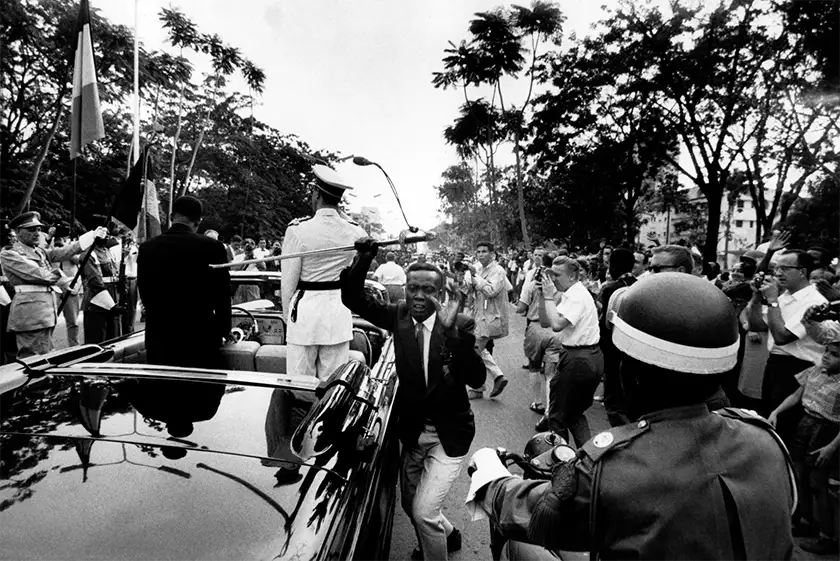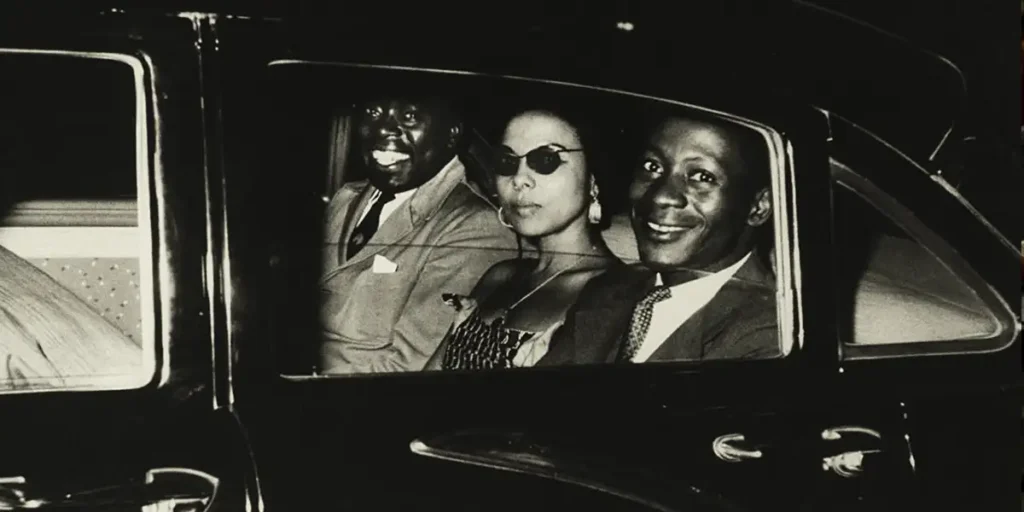Soundtrack To A Coup d’État is a mesmerizing (if overlong) look at how music can both inspire and placate the masses.
Director and Writer: Johan Grimonprez
Genre: Documentary
Run Time: 150′
BFI London Film Festival Screening: October 15-17, 2024
U.S. Release Date: November 1, 2024 (limited)
U.K. Release Date: November 15, 2024
Where to Watch: In select US theaters and in UK and Irish cinemas
The births of new countries are usually accompanied by songs of rebellion. New anthems and calls to arms brace the populace for a new era of self-determination. Soundtrack To A Coup d’État tells a different story. Johan Grimonprez’s documentary explores what happens when music gets weaponized in the other direction. The thesis of the film is that existing music, most of it very well-known, and not all of it political, is used to placate the rabble. Worse still, it diverts them from sinister goings-on at the heart of democracy. As democracy undergoes repeated pressure tests of late, Soundtrack To A Coup d’État serves as a vital reminder of how mass manipulation is more commonplace and more insidious than we realize.
The death of Patrice Lumumba, the first prime minister of the Republic of the Congo, continues to be a black stain on the region’s history. Though only officially the prime minister of the newly independent nation for a number of months before being abducted and shot in 1961, Lumumba’s assassination remains emblematic of the post-colonial struggle in Africa. It’s a grim story, but Soundtrack To A Coup d’État wants to avoid being too maudlin, without sacrificing the facts. The soundtrack to which the title refers is a constant jolt back from the edge of complete misery. Various jazz musicians of the era are featured in archive footage and on the soundtrack, setting the scene by providing both context and political heft. Nina Simone appears early on, and few people can capture the activist spirit of the time so distinctly as she did, her unique sultry voice subtly extolling rebellion with her rendition of ‘Wild Is The Wind’.
The refreshing spirit of change opens Soundtrack To A Coup d’État, with Max Roach demonstrating his new approach to timing on the drums, the hiss of the cymbal propelling the audience forward into speeches from Khrushchev, Eisenhower, Allen Dulles and Malcolm X. Grimonprez emphasizes the building tensions between East and West at the height of the Cold War, with nuclear unease rising and racial aggression bubbling just under the surface. The writer-director’s thesis is that the now-independent nations of the African continent were now ripe for plucking for their natural resources, and the powers that be wanted all they could get. It’s no coincidence that the Congo, with its abundance of uranium deposits, was in the news so much at the height of the nuclear arms race.

Lumumba’s death was orchestrated by right-wing leaders in the country, aided by the Congo’s former colonial power of Belgium. Even the C.I.A. has been implicated. Lest this all seem like angry speculation or agitprop, Grimonprez cites his sources. In between footage from the United Nations, where leaders speechify on peace and liberty, quotes from leaders, aides and academics are introduced on screen to contradict and clarify what was said in public. All quotes come with references, right down to the page number, inviting home viewers to pause, research and draw their own conclusions.
As Congolese academic In Koli Jean Bofane reads from his defining work Congo Inc., the crushing pressure of corporate interests and international chest-beating haunts the film like smoky spectres. All this is consistently accompanied by the sounds of the jazz greats, some of whom were sent by the U.S. government to Africa as envoys of goodwill. Soundtrack To A Coup d’État finds strength in the moments when some of those musicians reject being co-opted into these efforts. Hearing Louis Armstrong refuse to go until the situation in the American South is resolved is a tonic.
Grimonprez is detailed, and laser-focused on getting the point across. Meanwhile, the soul and fire of the emergent jazz movement drives home the point; Dizzy Gillespie announces his intention to run for President, while his music announces him as a force to be reckoned with. There’s a fascinating documentary to be made on Gillespie’s political aspirations, but Soundtrack To A Coup d’État’s focus lies elsewhere. The music becomes less of an interest to Grimonprez as the machinations against Lumumba come to cruel fruition. The music and the history never feel like they compete for air in the film’s skilful edit, so it seems a pity that Grimonprez feels he has to choose one over the other as time goes on. The final act of the film is full of detail, but the energy of the rest of the movie fades, and only then does its 150-minute runtime start to be felt.
History lessons are rarely as entertaining as Soundtrack To A Coup d’État, and it certainly refuses to be considered as anything less than the truth. While one can’t finesse or trim the fat of history for fear of losing vital details, the film does struggle to maintain its own momentum. It plays like a great jazz solo: it might go on longer than you expect, but its mesmerizing energy and the commitment of the artist behind it are undeniable.
Soundtrack to a Coup d’État will be screened at the BFI London Film Festival on October 15-17, 2024. The film will be released in select US theaters on November 1, 2024 and in UK & Irish cinemas on November 15. Read our list of 30 movies to watch at the 2024 BFI London Film Festival!

